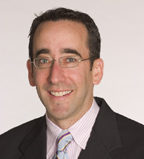“Joseph’s master had him put in prison…but even while he was there in prison, God was with Joseph.” -Genesis 39:20-21
Bulletproof glass separates me and my congregant. David [not his real name] and I sit opposite one another, in identical, soundproof, cinder-block visiting cubicles at a prison an hour’s drive from my home. He’s wearing a loose-fitting prison-orange v-neck with a black crewneck underneath. As our eyes connect, we smile. He reaches for the gray plastic phone attached to the wall on his side. I reach for mine. “Hi David, it’s really good to see you.”
“Rabbi Lezak, thank you so much for coming. Tell me how you’ve been. How’s your family? How are things back at the temple?” Months behind bars had not dimmed the menschy light that I recognized in David when we first met many years prior. On the tabletop in front of him sat a ballpoint pen, a yellow legal notepad, and a soft-bound JPS Tanakh.
“David, tell me about life in there. What’s easy? What’s not so easy?” He told me stories about his daily schedule, his work responsibilities, and his cellmate. He told me about how the color of an inmate’s uniform corresponds to the level of threat he poses to the prison population. And he told me stories about men who had spent time in solitary confinement. After we studied Torah (Genesis 39 that day), I asked David how his neshama, his soul, was holding up behind bars. “What is sustaining you? How are you maintaining hope?” I wondered if and when he, like Joseph, ever felt God’s presence there with him in prison.
“Rabbi Lezak, I would be lying if I said that things were easy for me in here. Things are very dark in my life these days. Prison life takes a toll on me. And on all of us in here. Thank God, my friends and family write and visit regularly. I’m always reading. And I’m really thinking about what I did that got me here.”
As we continued our conversation, David began taking notes. While he looked down at his legal pad, I could see, through the window behind him, the inner chambers of the prison. Here’s what I could make out: a tangled, cage-like web of steel bars, uniformed guards ushering inmates to and fro, and, miraculously, a beam of sunlight dappling the wall in the distance.
I realized at that moment that I was privy to a view that few of us ever get: a glimpse behind the walls into the masses of people that we, as a society, send outside the camp.
“God said to Moses, saying: ‘Instruct the Israelites to remove from camp anyone with an eruption or a discharge and anyone defiled by a corpse. Remove male and female alike; put them outside the camp so that they do not defile the camp of those in whose midst I (God) dwell’ (Lev. 5:1-3).” The goal, in Leviticus, of sending people outside the camp: maintaining ritual purity inside the camp. Our goal today in sending people outside the camp into the penal system? Punishment? Absolutely. Rehabilitation? Repentance? Not so much. We, as a society, have lost our moral compass here. Why are there 2 million more inmates in America today than there were 30 years ago? Why are a radically disproportionate number of these prisoners men of color? Why does America lock up more people per capita than Russia, China, or Iran? And how have we allowed the for-profit prison industry to become a multi-billion dollar business?
Leviticus gives us clear pathways for those who are impure to reclaim a sense of purity and to reenter the camp: time-frames, priestly visits, sacrifices, ritual. How long will it take us to repair our broken criminal justice and prison system? How long will it take us as a society to devise righteous and redemptive pathways for those who are currently outside the camp to not only come back home, but to stay there?
Thirty minutes into our visit, a buzzer rang. Our time was up. Knowing that David was about to reenter a world ‘outside the camp,’ I raised my right hand to the glass. David’s hand met mine. Looking into his eyes, I whispered into the gray phone the priestly blessing that is in this week’s parasha: “David, may the Holy One bless you and keep you safe. May the light of God’s face shine upon you graciously. And may God’s face rise to meet yours and may you know an increasing sense of shalom, of healing and wholeness and peace.” With that, I waved goodbye, walked to my car, and began my drive back to the temple. I have thought about David, his fellow prisoners, and our broken justice and prison systems every day since.
Rabbi Michael Lezak is Associate Rabbi at Congregation Rodef SHalom in San Rafael, CA. He is joining the T’ruah Board in June.


